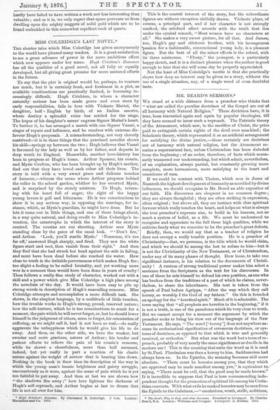MISS COLERIDGE'S LIST NOVEL.*
THE shorter tales which Miss Coleridge has given anonymously to the world have pleased many readers. It is a great satisfaction to see a great advance of power in the more ambitious effort ' which now appears under her name. Hugh Crichton's Romance has all the qualities of a good novel, not all fully or equally developed, but all giving great promise for more matured efforts in the future.
To say that the plot is original would be, perhaps, to venture too much, but it is certainly fresh, and freshness in a plot, as available combinations are practically limited, is becoming in- creasingly difficult. Hugh Crichton, in whom a character naturally serious has been made grave and even stern by early responsibilities, falls in love with Violante Mattei, the daughter, half - English by birth, of an Italian maestro, whose destiny a splendid voice has settled for the stage. The hopes of his daughter's career engross Signor Mattei's heart. To further it, he has arranged a match with one Signor Vasari, a singer of repute and influence, and he receives with extreme dis- favour Hugh's proposals. A misunderstanding, not very cleverly contrived—it is in these things that the practised novelist shows his skill—springs up between the two ; Hugh believes that Vasari is favoured by the lady as well as by her father, and departs in deep wrath to England. Meanwhile, another love-history has been in progress at Hugh's home. Arthur Spencer, his cousin, and Mysie Crofton, who has been brought up by Hugh's mother, find out that they have loved each other all their lives. The story is told with a very sweet grace and delicate touches of humour,—witness the scene where Arthur proposes behind the roller in the school garden, whither he has escorted Mysie, and is surprised by the stately mistress. To Hugh, return- ing with his heart full of anger, the sight of the happy young lovers is gall and bitterness. He is too conscientious to show it in any serious way, in opposing the marriage, for in- stance, which, as Mysie's guardian, he might have done. But he lets it come out in little things, and one of these brings about, in a way quite natural, and doing credit to Miss Coleridge's in- vention, the catastrophe in which the interest of the story is centred. The cousins are out shooting. Arthur sees Mysie standing close by the gates of the canal lock. " 4 Don't fire,' said Arthur. Look, you'll startle Mysie."Nonsense, it's too far off,' answered Hugh sharply, and fired. They saw the white figure start and reel, then vanish from their sight." And then they find that she had struck her head against the side in falling, and must have been dead before she reached the water. How close to truth is the irritable perverseness which makes Hugh fire; too slight a feeling to be called brutality, and yet working more woe in a moment -than would have been done in years of cruelty I Then follows a really fine study of character, worked out with a skill and a power which give Miss Coleridge a high place among the novelists of the day. It would have been easy to pile up strong words in description of Hugh's unavailing remorse. Miss Coleridge attempts and accomplishes a more difficult task. She shows, in the simplest language, by a multitude of little touches, how the trouble works in Hugh's strong, proud, reserved nature; how the self-torture, which he is too conscientious to remit for a moment, the pain which he will never forget, or, lest he should lower himself in the judgment of others, seem to forget, his ostentation of suffering, as we might call it, had it not been 80 real,—do really aggravate the unhappiness which he would give his life to do away. And then, on the other side, we have the weaker, but sweeter and more gracious, nature of Arthur; his tender and patient efforts to relieve the pain of his cousin's remorse, while he shows a cheerfulness, more than half assumed, indeed, but yet really in part a reaction of his elastic nature against the weight of sorrow that is bearing him down. Nothing in the book is liner than its description of the way in which the young man's innate brightness and gaiety struggle, unconsciously as it were, against the sense of pain which he is yet too faithful to put away. And then at last we are shown how "the shadows flee away ;" how love lightens the darkness of Hugh's self-reproach, and Arthur begins at last to dream that life is not all over for him.
• Heigh Oriehton's nomane. By Chrietabel B. Coleridge. 2 vols. London : Macmillan mad Co. 1878. This is the central interest of the story, but the subordinate figures are without exception skilfully drawn. Violante plays, of course, a principal part, and if her character is not strongly marked, the subdued effect accords with the truth that lies under the cynical remark, "Most women have no characters at all." She makes a very sweet picture, for all that. And James, too, Hugh's gay and dilettante brother, with his incongruous 'passion for a fashionable, conventional young lady, is a pleasant figure. But the best of all -the minor effects is the school, with its three mistresses. "Flossy," the youngest, is a particularly happy sketch, and it is a distinct pleasure when theAuthor is good enough to hint that she will some day be properly appreciated.
Not the least of Miss Coleridge's merits is that she practically shows how deep an interest may be given to a story, without the use of a single situation, nay, of a single -word of even doubtful taste.


































 Previous page
Previous page